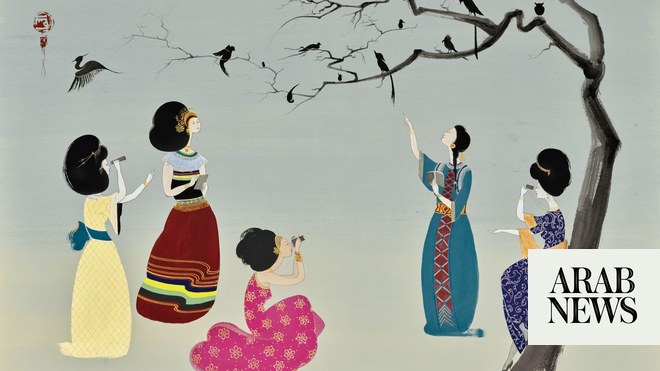
Selected works from the Atassi Foundation’s online auction, which begins May 25
In his “Suitcase Memory” series, Hamameh addresses the situation of those forced to flee their homes and homeland during Syria’s brutal ongoing civil war, leaving with only what they could fit into their luggage. Hamameh himself is one of them, now living in Germany. In the auction catalogue, Hamameh explains that the vivid colors of his paintings are used not in a bright, optimistic way, but to hint at the violence of war. Hamameh has felt since his childhood that intense color can be overwhelming.
Terjuman’s symbolism-heavy surrealist works tackle issues including displacement and identity. “She uses common items and natural elements … and then juxtaposes them against a particular setting,” the catalogue explains. Given Terjuman’s own background, the themes of her work are no surprise. “The history of my practice is overwhelmingly informed by my status as a hybrid migrant,” she explains. “My father is Syrian, my mother is Swiss and I was born in Morocco. I cherished the status of hybridity which, to me, offers a rich mix of backgrounds, voices, and belongings.”
Deeb started out as a sculptor and only began drawing and collage after leaving Syria, since when she has “depicted aspects of migration using her own experience as well as stories from others,” according to the auction catalogue. “I express myself through my works — my personality, my emotions, and the feelings that I experience. You see feelings of sadness if my psychological state tends towards sadness, and the same is true if I feel happy,” Deeb says. “My work is an expression of me, in my depths.”
Oddly, perhaps, one of the most optimistic works at the exhibition was created by an artist still living in Syria. Jadeed was born in Tartous in 1946, and continues to find inspiration and joy in his hometown. “When I draw the city of Tartous, I draw inspiration from a world of intertwined elements, where water, humidity and light mingle with architecture and history; where the reflections in the water are still the same as they have always been,” he says.
Abdallah’s large figural minimalist paintings are inspired by Chinese and Japanese design. “He often uses ground rocks and sand in his work — similar to the elements of a Zen garden,” the catalogue states. “I love to keep the invisible secret,” the Lebanon-based Hasakah-born artist says. “Perhaps it will stimulate my desire to meditate. I cannot see everything at once, so I am always in doubt.”
‘Dinner of Angels’
Hammoud Chantout
“Chantout is known for creating mystical paintings on various themes, including age-old legends or myths; nature as the all-giving mother; and the sense of loss and isolation concerning his homeland,” the auction catalogue says. Chantout spent much of his childhood bedridden by illness, and it was then that his creative imagination first came to the fore. “I used to stare at the wall to see pictures of battles, horses, trees and faces. Every day the scene on the wall changed,” he says. “This was my sole amusement when I was young.”












